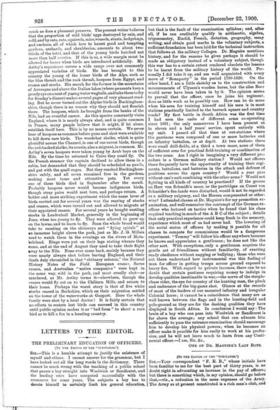LETTERS TO THE EDITOR.
THE PRELIMINARY EDUCATION OF OFFICERS.
[To THE EDITOR OF TIM "SPECTATOR."]
Sm,—This is a humble attempt to justify the existence of myself and others. I cannot answer for the grammar, but. I have looked out all the long words in the dictionary. There cannot be much wrong with the teaching of a public school that passes a boy straight into Woolwich or Sandhurst, and the leading ones have competed successfully with the crammers for some years. The subjects a boy has to devote himielf to certainly limit his general education,
but that is the fault of the examination syllabus ; and, after all, if he can creditably qualify in arithmetic, algebra, trigonometry, Euclid, French, dictation, geography, essay writing, and obtain good marks in the voluntary subjects, a sufficient foundation has been laid for the technical instruction that follows at the military Colleges. Dr. Maguire mentions history, and for the reasons he gives perhaps it should be made an obligatory instead of a voluntary subject, though this war has to a certain extent rendered obsolete the lessons to be learnt from the military history of the world. Per- sonally I did take it up, and am well acquainted with every move of " Bonaparty " in the period 1790-1820. On the other hand, I am a little sketchy as to the construction and measurements of Ulysses's wooden horse, but the slim Boer would never have been taken in by it. The opinion seems to prevail that the officer, once he joins his regiment, does as little work as he possibly can. How can he do more when his area for training himself and his men is in most stations practically limited to the barrack square and country roads? My first battle in South Africa was the first time I had seen the units of different arms co-operating since 1891; the only manoeuvres I have been present at in eleven and a half years' service, spent entirely with my unit. I passed all that time at out-stations where the garrisons were composed of one or more batteries and an infantry battalion, or at depot. At two stations there were small drill-fields, at a third a town moor, none of them of sufficient area for practical field-training or combination of the two arms. Am I right in imagining a very different pro- cedure in a German military station ? Would not officers there frequently have the opportunity of training their regi- ments, battalions, and batteries in the attack and defence of positions across the open country ? Would a year pass without one's unit combining with the other arms ? Would not fighting in all kinds of country be practised? If the grouse on Herr von Schmidt's moor, or the partridges on Count von Schneider's fen-lands were disturbed, would it not be regarded as a military exigency, and the Herren compensated or other- wise? I attended classes at Dr. Mag,uire's for my promotion ex- amination, and well remember the contempt of the German ex- officer who lectured on tactics when he found that his class required teaching in much of the A B C of the subject ; details that only practical experience could keep fresh in the memory, experience which most of us had never had. The lowering of the social status of officers by making it possible for all classes to compete for commissions would be a dangerous experiment. "Tommy" will follow his officer anywhere because he knows and appreciates a gentleman; he does not like the other sort. With exceptions, only a gentleman acquires the gentle art of friendliness without familiarity, of exacting ready obedience without nagging or bullying; those who were out there understand how instrumental was this feeling of man for officer in getting troops across ground exposed to heavy fire. With regard to private incomes, there can be no doubt that certain pastimes requiring money to indulge in develop qualities inestimable in war,—the nerve of the steeple- chase rider, the eye for country of the hunting man, the pluck and endurance of the big-game shot. Glance at the records of most of the leaders of our mounted infantry and irregular Colonial horse; it cannot be-a coincidence that many are as well known between the flags and in the hunting-field and polo-ground as they are for the dashing qualities they have
displayed in South Africa. In conclusion I would say : The brain of a boy who can pass into Woolwich or Sandhurst is far above the average; any school that can educate him sufficiently to pass the entrance examination should encourage him to develop his physical powers; when he becomes an officer make it possible for him really to work at his profes- sion, and he will not leave much to learn from any Conti- nental officer.—I am, Sir, &c., ONE OP DR. MAGUIRE'S LAZY BOYS.






































 Previous page
Previous page